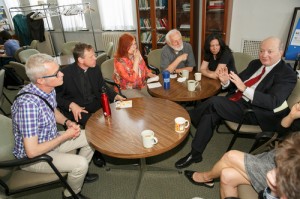
Senator Hugh Segal spoke about guaranteed annual income for Canadians at St. Anne, Toronto, on May 25. The parish’s Social Justice and Advocacy Working Group had invited him to speak during the Sunday morning service. The following is an abridged version of Senator Segal’s address.
By Senator Hugh Segal
My exposure to the realities of poverty, both as they affect our lives and the moral challenge related to dealing with it, began when I was very young. Calling my parents lower working class in Montreal would have been a significant overstatement of their economic circumstance. I recall baskets of food being delivered by the local congregation when they knew that we were in some trouble. I recall dining room table gatherings on Sunday night with the bills piled high and my father saying, “We have bills for groceries, bills for drugs, bills for doctors, bills for the rent and bills for the heat. We can pick any two to pay this month.” That was part of the reality.
I also attended religious schools between the ages of seven and 16 – a pre-rabbinical seminary in Montreal. I was taught from the Old Testament about where poverty stood in terms of what God expected of all of us. Deuteronomy 15:11: “You shall open wide your hand to your brother, to the needy and poor in your land.” Leviticus 23:22: “And when you reap the harvest of your land, you shall not reap your field right up to its edge nor shall you gather the gleaning after your harvest. You should leave them for the poor and the sojourner. I am the Lord your God.”
Friends, poverty is too often dismissed by politicians on the far right and the far left as being the result of people being simply lazy and don’t want to work. They say it is so complex, there is no way to solve it without a hundred different special programs. In this city, the vast majority of poor people have a job. Some have more than one. But the jobs have wages that are so low they don’t produce the income necessary to cover the rent, the food, the heat, the transportation and the clothes. This myth about people sitting on couches and watching television and eating popcorn is generally absolutely untrue.

Those who argue that poverty is very complex are against doing something simple that addresses the core question. They say poverty is the result of low education, of parental dysfunction, of drug abuse, of illiteracy, of immigration status, of not finishing school. They say those causes are way too complex to solve in any simple way, so the poor will always be with us and we just have to soldier on, doing what we’re doing, when we know that what we’re doing is not working.
The rate of poverty in this country, which is somewhere between nine and 15 per cent depending on the part of the country you live in, hasn’t changed in a quarter of a century. Existing welfare programs, though well meaning and run by people who are doing their very best, do not lift anybody out of poverty. Quite the contrary. The administration around eligibility for welfare has 800 rules. You can be the finest public servant in the world and working as hard as you can, but that is an unmanageable workload.
We had this problem with respect to our senior citizens back in the 1970s. The Toronto Star did stories about senior citizens being evicted from their apartments because they couldn’t afford the rent and were buying dog and cat food to have a little bit of protein to add to their diets because they couldn’t afford real food. In that period of our history, 35 per cent of our senior citizens were living beneath the poverty line. They were mostly women whose husbands had died without any savings or pension or equity built up in a home, and they were managing as best they could.
Four weeks (after those stories were published), the premier of Ontario stood up and brought in the Guaranteed Annual Income Supplement, which was very simple. There were no new civil servants, no new programs, no new forms to fill out. Instead, you simply filed your tax form, as we’re all supposed to do every year, and if you fell beneath a certain level, you were automatically topped up. That spread from Ontario to other provinces and eventually became part of the federal social security process.
In two years, that 35 per cent rate of poverty was reduced to three per cent. So when people say to me, this can’t be done, we’ve never done it before, there’s no experience, I say that’s not true. We have done it before, and we can do it again.
The OECD (Organization for Economic Cooperation and Development) says that in terms of poverty amongst senior citizens, Canada is in the top five in the world in terms of solutions that work. But when it comes to people who are poor and are of working age, there are 24 countries, some of which are much smaller and poorer than ours, that do a far better job.

The cost of topping up everybody in Canada who falls beneath a poverty line would be about 10 per cent of the present federal budget. When people say there’s not enough money to do that, I remind them that in 2008 and 2009, when the banks began to collapse in the U.S. and there was a huge financial problem, the government of Canada found $362 billion, in one year, to have CMHC (Canada Mortgage and Housing Corporation) buy perfectly good mortgages from the banks so that the banks would have the cash to lend to people who were coming in to borrow money for cars and mortgages and other things. I don’t disagree with that. They were good mortgages and we now own those mortgages as taxpayers and they’re generating a good, solid income. But if we can find $362 billion in one year, the notion that we can find $30 billion a year to top up those who fall beneath the poverty line strikes me as completely reasonable and utterly affordable.
There’s a town in Manitoba called Dauphin, and in the mid-70s, Prime Minister Trudeau and then Premier Edward Shreyer agreed to a test called the Mincome. In Dauphin, everybody was told that if for some reason there was a bad crop cycle and they didn’t do well at the end of the year, they would be topped up. Seventeen per cent of the people needed help, which meant that 83 per cent didn’t need help at all. Everybody benefitted because when they brought in that guarantee, guess what happened? Hostel admissions fell by eight per cent, car accidents fell, arrests fell, family violence fell. Do you know what increased? High school students staying to finish their high school education, which we all know is the best first step to a life of some measure of economic success and security.
We know the guaranteed annual income can work in Canada. It has been tried, and there is serious data available for our politicians to address.
I live in Kingston and we have seven prisons within 50 kilometres. Eight-five per cent of the people in those prisons come from the nine per cent of the population who live beneath the poverty line. The average cost of keeping someone in one of our prisons is from $60,000 per year to $170,000, depending on the level of security. How much more rational would it be to engage early on, so that people with no hope, no choices and are driven to do things because they cannot manage, actually have self-respect and dignity?
And understand this: if we had this national program as part of our tax system, none of the people who were topped up would be eligible for welfare. So the hundreds of millions of dollars spent by the provinces every month on welfare could be put into other programs – for seniors, for early childhood education, for a host of things we know are fundamental and vital.

My friends, we can do better. We can reduce poverty to a simple, refundable anti-poverty tax credit – or, guaranteed annual income – available simply upon filing your taxes.
Not eradicating poverty when we have the tools to do it is the ultimate immorality. As human beings in a wealthy country, we can do this. We can reach out to those who have their noses pressed to the window of the economic mainstream, against the windows of the restaurant we call Canada, knowing they can’t get in. We can say to them that with the grace of God, there is room for everybody at the family table that we call Canada. We have the wealth, we have the capacity and we have the system of distribution. We can move beyond simply the swells helping as best they can for charity. We can move beyond public servants forcing women to stand at bevelled glass to argue for enough money to feed their children. We can have a systemic, basic support, guaranteed income for everyone.
They said to Tommy Douglas, “You’re never going to have universal health insurance, so put it out of your mind.” They fought him, tooth and nail. They brought it in in Saskatchewan and eventually it was brought in for the rest of the country. This too can happen. We probably need a fair amount of engagement between all of us in our respective political parties, and I suspect a little bit of prayer always helps.
See also:
- The Diocese of Toronto’s social justice and advocacy work, including advocacy for a higher minimum wage and parish resources for the current Ontario election.
- Senator Hugh Segal’s article in The Globe and Mail on the guaranteed annual income.
- St. Anne, Toronto